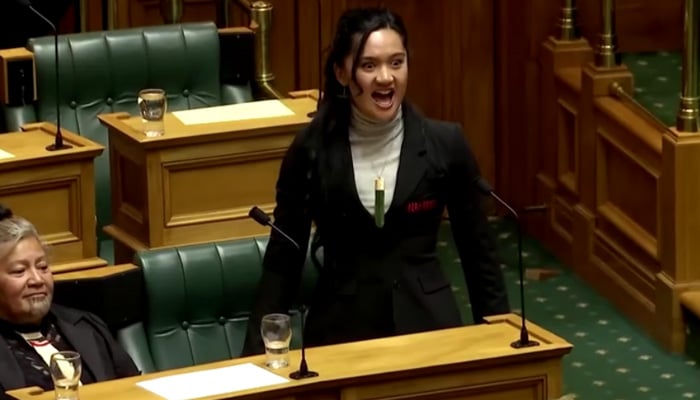
Maori lawmakers in New Zealand captured global attention after they staged a unique protest by performing the haka — a traditional dance made famous by the country’s rugby team — disrupting a vote on a controversial bill that would reinterpret a 184-year-old treaty between… The two countries. Native British and Maori.
The Treaty of Waitangi was first signed in 1840 between the British Crown and over 500 Maori chiefs, and sets out how the two parties agree to govern. The interpretation of the provisions in the document continues to guide legislation and policy today.
Court rulings and a separate Māori court gradually expanded Māori rights and privileges over the decades. However, some see this as discrimination against non-indigenous citizens.
ACT New Zealand, a junior partner in the ruling centre-right coalition government, last week unveiled a bill to enshrine a narrower interpretation of the Treaty of Waitangi into law.
In the video that went viral, Te Pati Māori MP Hana-Ruhiti Maebi-Clark was seen tearing up what appeared to be her version of the principles of the Treaty of Waitangi Bell.
Later, she began performing the haka dance with other opposition members who joined her when parliamentarians gathered for an initial vote on the bill on Thursday.
Parliament was briefly suspended as people in the hall joined in, screaming drowning out others in the hall.
ACT New Zealand leader David Seymour said people opposing the bill wanted to “stir up” fear and division. “My mission is to empower every person,” he added.
However, many Maori and their supporters view the controversial legislation as undermining the rights of the country’s indigenous people, who make up about 20% of the population of 5.3 million.
Hundreds have embarked on a nine-day march, or hikoi, from northern New Zealand to the national capital, Wellington, to protest the legislation, marching in towns and cities as they move south.
They will arrive in Wellington next Tuesday, where tens of thousands are expected to gather for a large march.
New Zealand police said in a statement that an estimated 10,000 people participated in a march through Rotorua, about 450 kilometers north of Wellington.
Hundreds of demonstrators, some wearing traditional clothing, were greeted by hundreds, waving the Maori flag and chanting: Reuters reported on Friday.
Although the bill has passed its first reading, it is unlikely to gain enough support to pass into law.
Coalition partners, the National Party and New Zealand First, are only supporting the legislation through the first of three readings as part of the coalition agreement. Both parties have said they will not support turning it into legislation, meaning it will almost certainly fail.
